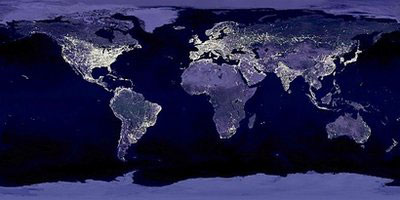|
 Undated image of Earth's city lights released by NASA. A growing, more affluent population competing for ever scarcer resources could make for an "unrecognizable" world by 2050, researchers warned at a major US science conference Sunday.(Agencies) |
|
A growing, more affluent population competing for ever scarcer resources could make for an "unrecognizable" world by 2050, researchers warned at a major US science conference Sunday. The United Nations has predicted the global population will reach seven billion this year, and climb to nine billion by 2050, "with almost all of the growth occurring in poor countries, particularly Africa and South Asia," said John Bongaarts of the non-profit Population Council. To feed all those mouths, "we will need to produce as much food in the next 40 years as we have in the last 8,000," said Jason Clay of the World Wildlife Fund at the annual meeting of the American Association for the Advancement of Science (AAAS). "By 2050 we will not have a planet left that is recognizable" if current trends continue, Clay said. The swelling population will exacerbate problems, such as resource depletion, said John Casterline, director of the Initiative in Population Research at Ohio State University. But incomes are also expected to rise over the next 40 years -- tripling globally and quintupling in developing nations -- and add more strain to global food supplies. People tend to move up the food chain as their incomes rise, consuming more meat than they might have when they made less money, the experts said. It takes around seven pounds (3.4 kilograms) of grain to produce a pound of meat, and around three to four pounds of grain to produce a pound of cheese or eggs, experts told AFP. "More people, more money, more consumption, but the same planet," Clay told AFP, urging scientists and governments to start making changes now to how food is produced. Population experts, meanwhile, called for more funding for family planning programs to help control the growth in the number of humans, especially in developing nations. "For 20 years, there's been very little investment in family planning, but there's a return of interest now, partly because of the environmental factors like global warming and food prices," said Bongaarts. "We want to minimize population growth, and the only viable way to do that is through more effective family planning," said Casterline. (Read by Nelly Min. Nelly Min is a journalist at the China Daily Website.) (Agencies) |
上周日,研究人員在一個大型美國科學(xué)會議上警告說,隨著地球人口越來越多,越來越富,人們對匱乏資源的爭奪可能會導(dǎo)致地球到2050年變得“面目全非”。 聯(lián)合國預(yù)測,全球人口今年將達(dá)到70億,到2050年將達(dá)到90億。非營利性組織人口理事會的約翰?邦戈茲說:“世界人口的增長基本都發(fā)生在貧窮國家,尤其是非洲和南亞地區(qū)的國家。” 在美國科學(xué)促進(jìn)會的年度會議上,世界自然基金會的詹森?克萊說,要養(yǎng)活這些人,“未來40年內(nèi),我們需要生產(chǎn)出過去8000年產(chǎn)出糧食的總和”。 克萊說,如果人口還按目前的趨勢增長,那么“到2050年我們的星球?qū)婺咳恰薄?/p> 俄亥俄州立大學(xué)的人口研究項目主任約翰?卡斯特林說,人口激增將會加劇資源損耗等問題。 不過,在未來40年人們的收入也會增長——全球人口平均收入會是現(xiàn)在的3倍,而發(fā)展中國家收入會達(dá)到現(xiàn)在的5倍——這會給全球食物供應(yīng)增加壓力。 專家們說,收入增長之后,人們會吃更多食物鏈上層的東西,會比他們賺錢少的時候消耗更多肉類。 專家們對法新社表示,生產(chǎn)1磅肉需要約7磅(合3.4公斤)谷物,生產(chǎn)1磅奶酪或者雞蛋需要3到4磅谷物。 克萊對法新社說:“我們會有更多的人口,更多的錢,消耗的也更多,但是我們只有一個地球。”克萊認(rèn)為科學(xué)家和政府應(yīng)該盡快開始研究轉(zhuǎn)變生產(chǎn)食物的方法。 同時,人口專家呼吁為生育控制項目提供更多資金,以控制人口數(shù)量的增長,特別是發(fā)展中國家的人口數(shù)量增長。 邦戈茲說:“20年來,盡管我們對生育控制的投資微乎其微,但是我們也收到了一些投資回報。這種回報從一定程度上是由于全球變暖和食物價格飛漲等環(huán)境因素迫使的。” 他接著說:“要想減少人口增長,唯一可行的方法就是借助更有效的生育控制項目。” 相關(guān)閱讀 美宇航局發(fā)現(xiàn)火星細(xì)菌 成生命新證據(jù) (中國日報網(wǎng)英語點津 崔旭燕 編輯:陳丹妮) |
|
Vocabulary: affluent: having a lot of money and a good standard of living(富裕的) exacerbate: to make something worse, especially a disease or problem(使惡化;使加劇;使加重) quintuple: increase or cause to increase fivefold(使)成五倍 viable: that can be done; that will be successful(可實施的;切實可行的) |
